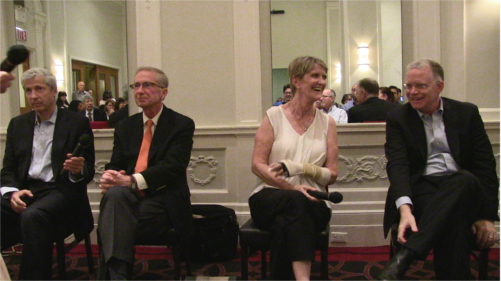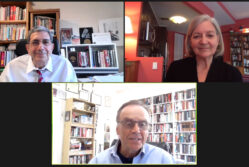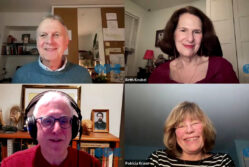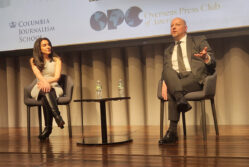Event Coverage Highlight

Panel Reflects on Uncertain Future of Afghanistan
By Chad Bouchard
Afghanistan has been the staging ground for proxy wars among world superpowers and its neighbors for centuries, with several conflicts grinding on since the late 1970s. Despite these foreign influences, Afghans have benefited little and the country remains poorly understood, particularly in the West, panelists told attendees at Club Quarters on Oct. 10.
During a discussion the OPC co-sponsored with Ford Motor Co., participants representing decades of experience in the country expressed frustration with relentless violence, lack of democratic progress, and dim prospects for peace in the near future.
“Afghanistan is very easy to enter, but it’s very hard to leave,” said Jere Van Dyk, quoting an old Afghan adage. Van Dyk covered the Afghan-Soviet war for The New York Times in the early 1980s and was kidnapped by the Taliban and held for ransom for 45 days in 2008. As the second American journalist captured by the Taliban after Daniel Pearl, he said surviving his ordeal sparked a deep conviction to investigate what really happened.
“I feel a tremendous obligation to those who did not survive. I feel a need to seek redemption for all the trouble we’ve put people through and all that has happened. In a way to try and resolve problems, make it better,” he said.
The FBI closed the investigation of his kidnapping in 2012, a move that also helped spur him to examine the case on his own.
Van Dyk said a key problem with American policy in Afghanistan is that diplomats, FBI and other US officials are only in the country for a 90-day rotation. Under British rule in the early 20th century, he pointed out, officials remained in the country for 16 years.
Van Dyk’s new book, THE TRADE: My Journey into the Labyrinth of Political Kidnapping, was released on the day of the panel.
Kathy Gannon, senior correspondent for Pakistan and Afghanistan for The Associated Press, covered the region since 1987 and was the only western journalist in Taliban-ruled Afghanistan during the U.S.-led invasion that followed the 9-11 attacks.
She said foreign influence makes the country extremely complicated, with Russia’s increasing anxiety about a growing ISIS presence in former Soviet states and Iran possibly supporting the Taliban while recruiting both Pakistanis and Afghans to fight in Syria.
“The danger always to me seems to be this desire to oversimplify a very complicated situation,” she said. “Every nation has their own agendas in Afghanistan, and it’s getting more so.”
Gannon was shot and wounded while covering an election in Afghanistan in 2014. Her friend and colleague Anja Niedringhaus was mortally wounded in the attack.
She said regular Afghans consider foreigners, including Americans and Western partners, as part of the problem.
David Rohde, online news director for The New Yorker and former reporter at Reuters and The New York Times, said with the Pentagon committing more troops and a spike in US attacks in Afghanistan, the death toll on civilians will continue climbing.
“What upset me about the Trump strategy was that it was not a solution. What’s constantly driven the American approach to Afghanistan, and it’s logical, is domestic American politics.”
He cited George W. Bush’s aborted revenge operation after 9-11, a limited surge under the Obama administration, and now Trump’s increased attacks and use of the “Mother of All Bombs” as examples of strategies rooted in the desire to satisfy constituents in the US.
“Last year I believe maybe 15 American soldiers died in Afghanistan, and I think at least 5000 Afghan police and soldiers died. So this is a holding pattern, what Trump is doing will not lead to a resolution.”
Rohde was kidnapped by the Taliban in 2008, escaping after 7 months.
Willam J. Holstein, who covered the Soviet invasion of Afghanistan in late 1979 and moderated the panel, asked Rohde what a viable strategy would be.
“I think you are either all in, which we’re not going to do, or you leave. This kind of middle of the road thing is just costing Afghans their lives.”
Please take a look at the playlist of clips from the program on our YouTube channel below.




